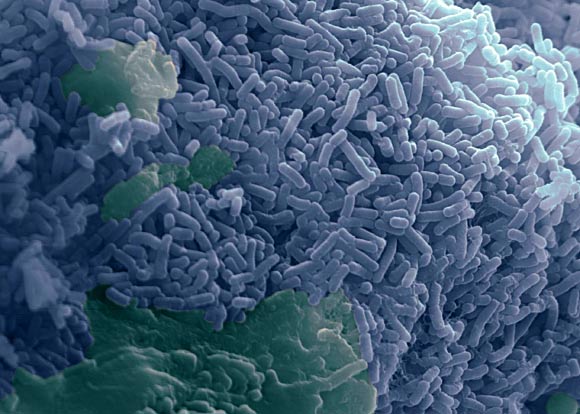Lactobacilli, a group of probiotic bacteria that ferment milk into yogurt and aid in the digestive process in the body, can reverse depression-like behavior and anxiety in mice, according to a new study published in the journal Scientific Reports on March 7, 2017.

Lactobacillus reuteri bacteria (blue). Image credit: Alistair Walsham & Stephanie Schüller, doi: 10.3389/fmicb.2016.00244.
Depression is one of the most common types of mental illnesses, affecting up to 7% of the population.
While improved diagnosis led to appreciation of the frequency of the disorder, better understanding of the mechanisms leading to depression is needed for the development of new therapeutic approaches for this debilitating disease.
The role of the gut microbiome has been of tremendous interest to researchers studying depression and other health conditions, both mental and physical.
Researchers at the University of Virginia set out to see if they could find a concrete link between depression and gut health.
“When you’re stressed, you increase your chance of being depressed, and that’s been known for a long, long time,” said lead co-author Dr. Alban Gaultier, a researcher in the Department of Neuroscience and the Center for Brain Immunology and Glia at the University of Virginia.
“So the question that we wanted to ask is, does the microbiome participate in depression?”
Looking at the composition of the gut microbiome before and after mice were subjected to stress, Dr. Gaultier and co-authors found that the major change was the loss of Lactobacillus.
With the loss of Lactobacillus came the onset of depression symptoms.
Feeding the mice Lactobacillus reuteri — a species that colonizes several vertebrate hosts, including rodents and humans — with their food returned them to almost normal.
“A single strain of Lactobacillus is able to influence mood,” Dr. Gaultier noted.
The authors then went on to determine the mechanism by which Lactobacillus influences depression.
They found that the amount of Lactobacillus in the gut affects the level of a metabolite in the blood called kynurenine, which has been shown to drive depression. When Lactobacillus was diminished in the gut, the levels of kynurenine went up — and depression symptoms set in.
“We identified that Lactobacillus-derived reactive oxygen species may suppress host kynurenine metabolism, by inhibiting the expression of the metabolizing enzyme, IDO1, in the intestine,” they explained.
“Moreover, maintaining elevated kynurenine levels during Lactobacillus supplementation diminished the treatment benefits.”
“Collectively, our data provide a mechanistic scenario for how a microbiota player (Lactobacillus) may contribute to regulating metabolism and resilience during stress.”
“This is the most consistent change we’ve seen across different experiments and different settings we call microbiome profiles,” said study first author Ioana Marin, a graduate student at the University of Virginia.
“This is a consistent change. We see Lactobacillus levels correlate directly with the behavior of these mice.”
Based on the new findings, the researchers plan to begin studying the effect in people as soon as possible.
They intend to examine the effects of Lactobacillus on depression in patients with multiple sclerosis, a group in which the disorder is common.
Promisingly, the same biological substances and mechanisms Lactobacillus uses to affect mood in mice are also seen in humans, suggesting the effect may be the same.
_____
Ioana A. Marin et al. 2017. Microbiota alteration is associated with the development of stress-induced despair behavior. Scientific Reports 7, article number: 43859; doi: 10.1038/srep43859







